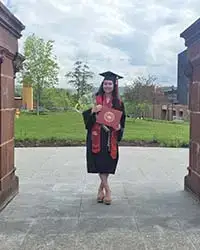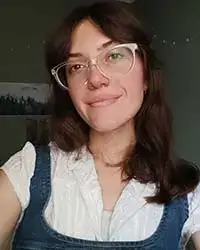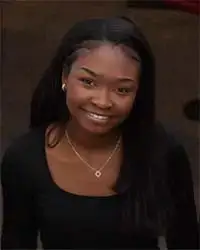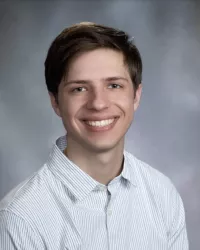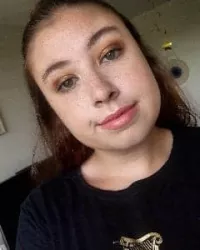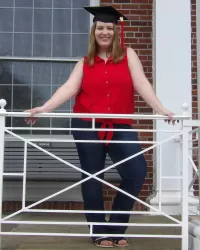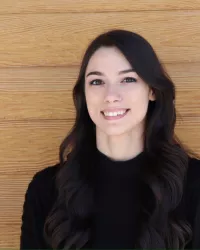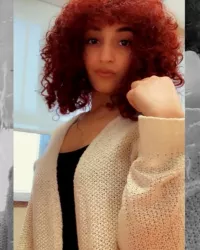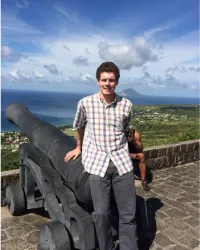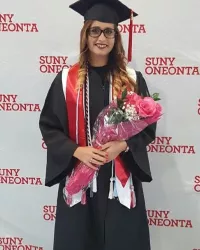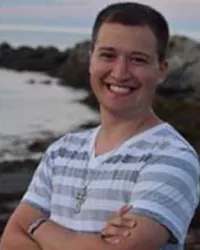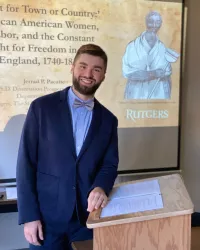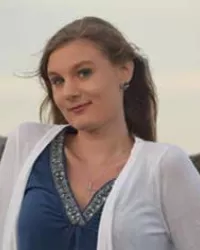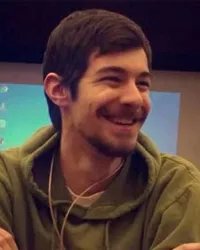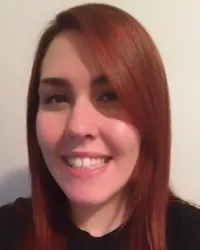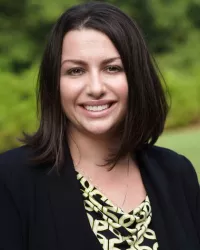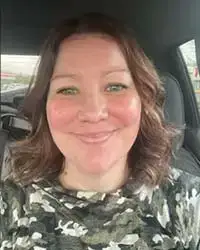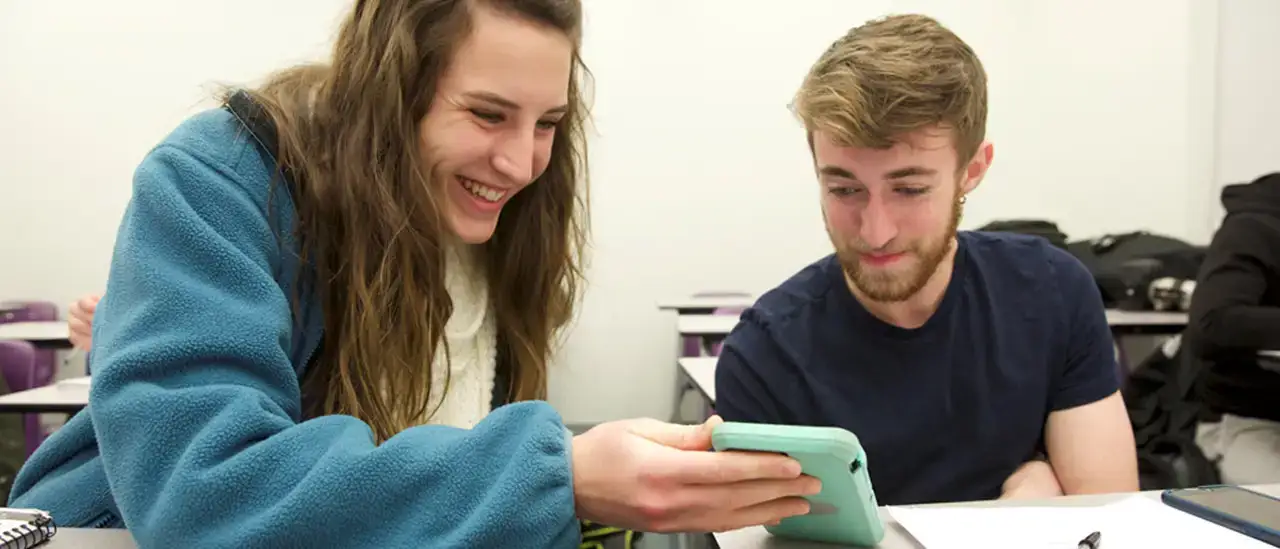Renata Palladino '25
Without a doubt I knew I was going to major in History when I went to college, but I was still unsure where I wanted to go to school. It came down to two schools, one in-state and one out-of-state, and I was also factoring in personal preferences like student body size, student diversity, location, programs offered, etc.
Having my senior year of high school end in 2021 during the midst of the COVID pandemic also pushed me to want a fresh start somewhere new and unfamiliar. Developing a newfound interest also in museum work and then a wish to pursue a career in public history limited my search yet instilled an intense drive to find the right match. SUNY Oneonta and its History department provided great reassurance for me in a majority of these areas.
While being at SUNY Oneonta from 2021-2025, I took a wide variety of History courses with almost all of the History professors. This is something that I cannot stress enough to history students and to college students in general. Getting to know your respective department by taking courses with new and old professors can forge connections and opportunities with just quick chats after class, office hour meetings, etc. You never know what can happen to you! I was able to secure a volunteering role at the Greater Oneonta Historical Society (GOHS) my sophomore year thanks to Dr. Matthew Hendley, my advisor and professor. Working closely with director Dr. Marcela Micucci and the rest of the staff and volunteers allowed me to test my history passion and interpersonal skills outside of the classroom. In addition to volunteering, I had the chance to do research for the exhibit, “Precautions Urged”: Public Health and Pandemics in Oneonta, alongside other SUNY Oneonta students in 2024. Taking time out of your already busy undergraduate schedule for outside projects can be overwhelming, but very much worth it in the long run.
Besides this, taking history courses about history unfamiliar to us is very much needed for personal and academic growth. In my opinion, historical literacy is a dying necessity in our current world and so many people do not realize the resources they have to learn and appreciate history. I personally enjoyed taking Law, Sex, and Medieval Society with Dr. April Harper and Tsarist Russia with Dr. Yuriy Malikov although I knew American History would be my main focus. History does not have to only entail politics and important figures. Taking courses such as History of NYC with Dr. Thomas Beal and Pop Culture and American History with Dr. Nicole de Silva explored the social and cultural historical happenings of our past. Just taking one college history course has the power to open your eyes immensely, as it did for me.
During my senior year, I took on the opportunity to be a TA for the course Contested Islands: Jamaica and Ireland taught by Dr. Matthew Hendley. I was able to take all the skills I have learned and developed over the years as a student and apply it for when I would lead activities and discussions for first year students. Helping students with interpreting images and documents, citing sources, and navigating Milne Library’s online database broaden my perspective of teaching history and the skills needed to do it justly. Working alongside Dr. Hendley also opened up space for me to become a leader for the students and a guide for the course to lay out academic expectations and aid.
In addition to courses, I was active in the History Club first as a member, second as Event Coordinator, and lastly as President. I really enjoyed having a community amongst my peers and cohort and it allowed us a space to talk about our individual history passions and day-to-day happenings. We went on field trips to history museums around New York State, co-hosted movie nights with history professors, held our annual history conference, went to the Alden Room in the library, and so much more. It was both a pleasure and an achievement to see all of this come to fruition while being a full-time student. Showing this kind of participation and interest can boost your image on applications and resumes when applying to internships and graduate schools. It is also a great way to make friends and find your people!
As of June 2025, I am in the beginning of my gap year and currently researching graduate programs around Boston since I reside in Massachusetts. The Cooperstown Graduate Program (CGP) for Museum Studies (which is affiliated with SUNY Oneonta) was also a huge influence on my decision to go to Oneonta. Going to SUNY Oneonta helps immensely in the application and interviewing process for CGP. I will still keep CGP in mind when applying later this year. I recall being a first-year student and thinking to myself that graduation and graduate schools were light years away from me, but you will be amazed how fast college goes by. I highly advise starting early and starting small when preparing for your future. Take the courses that seem a little out of your comfort zone history-wise or are more theoretical than what you are used to! Connect with professors and your advisor to lay out your goals and have help when navigating the processes of completing them! Everything counts and will be beneficial to you, trust me. I will always look back on my time as an undergraduate with extreme gratitude for the History department at SUNY Oneonta.
Olivia Neumann '25
My name is Olivia, and from August of 2021 to May of 2025 I attended SUNY Oneonta with History as my primary major and a dual major in Anthropology. In the fall of 2025, I will begin attending the acclaimed Cooperstown Graduate Program for Museum Studies on the History Track. In this statement, I will reflect on how majoring in History at SUNY Oneonta equipped me with the experience and skills necessary to shape my professional future.
During my first year of college, I was almost entirely unsure of my academic and career path. Like many other students, I felt intimidated and overwhelmed by all the new possibilities ahead. Moreover, in today’s world, in which STEM typically dominates the career stage, a History major is sometimes overlooked. However, during my time at SUNY Oneonta, I was constantly reassured that you can do something and so much more with a History major.
Through my History major, I gained a diverse range of skills – especially in critical thinking, research, and scholarly writing. I learned how to use valuable online archives like The Times of London, properly identify as well as cite historical sources, and write cohesive academic essays based on historical subjects which sparked my interest. I also gained time management, networking, and public speaking skills in my classes through research presentations and projects with my peers and professors. These abilities are valuable to countless fields and professions. I met students who applied these skills to careers in academia and museums, like me, but also fields such as environmental conservation and law enforcement. The History Department at SUNY Oneonta strives to provide students with an equally dynamic range of courses, giving you the freedom to explore and dive deeper into a compelling array of subjects through classes such as Black Women and Social Change with Professor Howard Ashford, Monarchs, Witches and Heretics with Professor Matthew Hendley, and Colonial Latin American History with Professor Miguel Leon. As a dual major, I found the course load to be manageable and enriching. I often gained skills which I could directly apply to my anthropology classes, providing a meaningful connection between my majors.
One of the best ways to explore your interests as well as clarify your academic goals is to pursue internships and volunteer work on and off campus. Thanks to the History Department, I had access to countless experiences. For example, during the summer break of my Freshman and Sophomore years, whilst I worked at my job in food service, I also volunteered a few times a week at a local museum. This allowed me to gain research experience outside of the classroom and build connections with museum professionals. With the encouragement from my professors, I continued to explore new paths including studying abroad in Peru, volunteering at the Greater Oneonta Historical Society, and contributing research to an upcoming book by the Albany City Historian on the history of the Albany Fire Department. Additionally, I co-curated an exhibit at the Yager Museum in Oneonta on the culture and history of Mexican masks, won the department’s annual essay contest in 2025 with my paper in on “The Nature of Crime and Punishment in Industrial Britain, 1750-1850,” published my essay on the Great Irish Famine in the SUNY Oneonta Academic Research (SOAR) journal in 2024, and presented research on the evolution of legal and social attitudes towards homosexuality in London at the SUNY Oneonta Student Research and Creative Activity (SRCA) Showcase in the spring of 2025. That conference-style experience was especially memorable, allowing students like me to organize and share their creative and scholarly work within a broader campus community.
The SUNY Oneonta campus also hosts a vibrant selection of clubs and student organizations, including the History Club, where I served as an e-board member for roughly three years. The club is another accessible way to get involved through a variety of fun and educational events such as the Annual History Conference, field trips to destinations like the New York State Museum, movie nights, discussions with professors, and career events! The History Club frequently collaborated with other departments, including Education, Women’s and Gender Studies and Sociology, helping students to benefit from interdisciplinary resources whilst remaining connected to their history studies. Through it all, I learned that just one opportunity and connection can open you up to so many more possibilities. What truly made the difference was the unwavering support of my professors. They were always available to help, providing guidance which gave me the confidence to challenge myself and achieve my academic goals.
If you are interested in history and want a college which fosters exploration and accessibility whilst structuring students with the tools for professional success, I highly recommend a History major at SUNY Oneonta. From my very first semester to my graduation, I was exceedingly aware of how much the History Department at SUNY Oneonta cares about the success and potential of each student. I came into college uncertain and left with a future career in museums. I found, as will you, a caring community in which you will grow not only as a student and professional, but as an individual.
Raynella Clarke '24
I first discovered my passion for History in the 6th grade. One afternoon in class, I was flipping through my textbook when a wave of curiosity and excitement washed over me. I was completed drawn to the stories of the past. This feeling would propel me to delve further into the study of History and later, culture. Still, I didn’t initially envision a career built around it.
When I started college in 2020, I first majored in Biology with a pre-med concentration, aspiring to become an Anesthesiologist. However, as I sat in class and took Biology and Chemistry classes, I found myself feeling unfulfilled. One day, I stopped into Academic Advisement where after talking to my counselor, Dylan Reger about my passion for learning about History and culture, he introduced me to Anthropology. I was excited about a field of study that beautifully combined these two interests, and I dove head-first into my pre-requisite coursework. It wasn’t long before I added History as my secondary major as I felt a desire to have solid background in both fields to be well-rounded.
As a new History major, my academic experienced was shaped by the inspiring faculty and the classes they taught. In Dr. Hendley’s Monarchs, Witches & Heretics class I learned how to properly conduct research, which laid the foundation for my journey in academic writing. Dr. Beal challenged me to think critically in his History of New York City course. I learned how to interpret historical facts and weave them into larger, more meaningful narratives. Through Dr. Harper’s History of Greece and History of Rome classes, I was introduced to the ancient world in vivid detail. Her teaching transported me to another age. I could almost see and feel the world she brought to life in every lesson. I was introduced to Historiography – the study of how historians interpret and write about the past - in my Historiography capstone taught by Dr. Leon. Through a variety of readings on Incan society, we explored how different historians offered unique perspectives on the same subject. This experience showed me that there is no single way to study history. Instead, each historian’s personal approach contributes to a richer understanding of the past.
I also had opportunities to learn outside of the classroom. As the Historian of the Black Student Union, I helped to document the founding and History of the new club. I also volunteered for New York State History Day twice. In 2022, As a dual major in Anthropology, I participated in the Pine Lake Archaeology field school. I worked as an intern at the Genessee Country Village and Museum in Rochester New York in the summer of 2023, doing research for the museum where my work supported a successful grant application for new exhibits and inclusive programming. I also earned first place in the Historiography category of the 2024 Maynard Redfield Essay Contest for my essay examining how language translation influenced the religious conversion of the Mayan people during Spanish colonization.
Since graduating in 2024, I’ve been employed at SUNY Oneonta through Dragon Corps. as the Assistant to the Chief of Staff, where I assist the Office of the President in a wide range of responsibilities. My degree in History has prepared me for this role by helping me to develop essential skills that I use every day. As a student of History, I’ve learned how to think critically and conduct research, I’ve also learned how to manage my time effectively and to pay attention to detail. One of the most important skills I have learned however, is how to write and communicate in a professional manner which helps me with the aspect of my job that focuses on communicating information to the campus. Whether it’s writing newsletters, announcements, memos or sending out correspondence to faculty, staff and students, my experience writing for my history classes has equipped me to communicate clearly and effectively. Finally, my background in History as well as anthropology has provided me with the cultural awareness which informs my interactions in a diverse work environment.
Working at my alma mater as a member of Dragon Corps. is a true privilege. Each day, I have the opportunity to learn from dedicated faculty and staff—many of whom once supported and inspired me as a student. Their continued mentorship now shapes my professional journey. It’s especially meaningful to collaborate with the very individuals who helped make my college experience so impactful, as we work together to create those same transformative experiences for today’s students.
I’m grateful every day that I chose to follow my curiosity and change my major. That decision not only aligned my studies with my passions but also showed me that success feels more attainable—and more rewarding—when you genuinely enjoy what you’re learning. My love for exploring the past has sparked a genuine interest in teaching history, something I hope to pursue further as I consider graduate school. While I don’t yet know exactly where my career will lead, I’m confident in the strong foundation I built as a history major at SUNY Oneonta. It has equipped me to move forward with confidence, curiosity and purpose.
Clifford Sweezey '21
I chose to major in history at SUNY Oneonta to lay the foundation for becoming a secondary education social studies teacher. History and the overall social studies curriculum have been both an interest and passion of mine since a young age, which I hope to pass on to future students to help offer a better understanding of the world’s past and present.
I actually started my college career at another university, and having transferred to SUNY Oneonta after my first semester, I have come to appreciate the benefits of attending a smaller school. First, this allowed me to build great relationships with my professors who were able to critique and help me improve as a student. This was done by simply participating in class, attending office hours, or through email correspondence. Larger schools tend to have larger class sizes, which can easily take the time and attention away from you the student, resulting in less than stellar assistance and input from your professor as you would at a smaller school such as SUNY Oneonta. Second, having such good relationships with the history department also offered several opportunities throughout my college career. One benefit was being able to have strong letters of recommendation written for my graduate school applications that attest to my strengths beyond my grades. Unfortunately due to the COVID-19 pandemic, I was unable to take part in, but was planning to go on a study abroad/faculty-led trip to Washington D.C. and Japan! Once study abroad programs are offered again, I would highly recommend seeking out a course and destination that interests you. My professors also recommended me for scholarship opportunities, and even an internship that I took part in during the summer of 2020 for the Greater Oneonta Historical Society. I helped document the history and ultimate destruction of the grandstand of Oneonta’s Damaschke Field, a baseball field in downtown Oneonta that showcased up and coming minor league ballplayers, and even legends like Babe Ruth! Another interesting opportunity that the history department offered was being able to have an account of my COVID-19 experience published into a text anthology of other students and faculty by SUNY Press, hopefully to be released sometime in 2022. The pandemic has already left its mark on history, and being able to have my thoughts, emotions, and experiences documented as a primary source can broaden our understanding of such a tumultuous time.
I was also able to push myself and succeed in my studies because the history department offers a wide array of classes among the three main fields of American, European, and World history. There wasn’t one class that I did not enjoy, but some of my favorites would include the History of World War I with Dr. Freeman, 1960’s U.S. History with Dr. Ashford, the History of Soviet Russia with Dr. Malikov, Sports in American Society with Dr. Simons, and my research seminar on British Imperialism with Dr. Hendley. What made my history classes so enjoyable was having interesting readings, open discussions of course material, and a good amount of freedom when choosing a research topic to write about. This allowed me to write about what I had an interest in, and encouraged me to make a strong and cohesive argument with my interest as the driving force.
Being able to succeed in SUNY Oneonta’s history program has greatly enhanced my reading, writing, and critical thinking skills. All of these seemingly simple skills are necessary for any career path you choose to pursue. That being said, majoring in history does not pigeon-hole into one career path from the start. Like myself, you can choose to enter the education field, but if not, can just as easily pursue a career in the legal field, museum studies, archival work, or work as a historian for a company or institution. The history department at SUNY Oneonta will serve the interests of you the student, to help you succeed academically and graduate, and then support what you want to do with your career afterwards. This is not a decision that needs to be made by the start of your undergraduate career, but through an ever-evolving decision-making process throughout your time at SUNY Oneonta. One way of helping students with postgraduate endeavors is by hosting workshops and panel discussions on the different fields that you can enter with a history degree. I was fortunate to be a part of the panel for careers in education workshop to share my application process for graduate programs, while also being able to hear from several Oneonta alumni about their own journeys to get where they are now as educators. There are plenty of options to choose from after graduation, but one thing that is certain is that a history degree at SUNY Oneonta is an invaluable and worthwhile experience!
Patricia Cahill '21
I started my journey at SUNY Oneonta, majoring in Biology with a pre-med track, but halfway through my first semester, I figured out that I hated biology and that it was not the right path for me. So, after a lot of brainstorming and searching, I decided that history was the right fit for me, and it was the best choice I ever made. I was welcomed into the history department with open arms.
I was given a plethora of pamphlets about the history department, future career options, and some student testimonials by Professor Hendley while Dawn was filling out my change of major paperwork. I was so nervous about changing majors because it was a complete 180 from my previous life plan, and I had nothing figured out yet. The professors and the people I met truly accepted me for who I was and all my little quirks, and we understood each other in a way that I had never experienced.
Dr. Mette Harder was the best advisor I could have asked for. She always talked to me about my plan and what I wanted to steer me in the right direction instead of pushing me to do something else. Dr. Julie Freeman made learning about the politics and culture of war interesting in her World War I and Nazi State classes, and she is such a kind person who was always there to talk if needed. I am so happy that she retired, and I hope she enjoys it and gets to travel as much as she can. The professor who made the most impact on my life during my college career was by far Dr. Susan Goodier. Dr. Goodier is one of the most intelligent women I have ever had the privilege to know, and if you have the opportunity to take a class with her, DO IT! She will challenge you in ways that you have never been challenged before, but I promise she only does it out of the kindness of her heart and will always be there to help. Being a Teaching Assistant for her Women’s History class was the most valuable experience during my time in college, and it is an opportunity I can never thank her enough for. Through that class, I learned important skills like communication, leadership, public speaking, organization, and the vast importance of setting boundaries with students. Also, through Dr. Goodier’s classes, I met one of the best people I have ever met, who is now my best friend and was my biggest support for finishing my degree during a pandemic. While taking classes with Dr. Goodier, I was able to meet and have conversations with Dr. Sally Roesch Wagner, a woman who played a significant role in the foundation of Women’s Studies programs across the nation. I also participated in a workshop led by Dr. Gretchen Sorin, the director of the Cooperstown Graduate Program, and listened to the work of two other members of CGP. The professors in the History Department made me feel accepted, and soon Bacon Hall started to feel like home.
Even though my career choice changed several times during my short time as a history major and seemed to land on something different every time, I always felt supported and encouraged. I was never told that I could not do something for any reason; I was always told the exact opposite. The professors in the History Department always supported me in making a decision that was best for my life plan and gave me the tools and knowledge to go into the career I wanted to. Planning to head into such an uncommon career as genealogy was a scary decision for me, but I knew it was the right one and felt even more encouraged to do it because of how uncommon it was.
Cheyenne Aney '21
I was lucky enough to grow up in a family that loved history. The summers of my youth were spent exploring historic sites with my parents and siblings and running through the exhibits of the Utica Children’s Museum with my grandmother. By my freshman year of high school I knew I wanted to major in History during college and by my sophomore year I had begun working at the Farmers’ Museum and the Fenimore Art Museum in Cooperstown, NY. In 2018, I turned to SUNY Oneonta’s History Department to further my education and help me focus on what I wanted to pursue after my degree.
I began my History career at Oneonta during my first semester in Dr. Hendley’s Monarchs, Witches, and Heretics class. This is where I learned about Tudor/Stuart England and became enamored with how college history classes pushed me to think harder and create a deeper analysis of events. I would go on to take two more classes with Dr. Hendley which would broaden my knowledge of British History and the influence that Britain had on the rest of the world especially in Shanghai and Hong Kong. During my third class with Dr. Hendley, he suggested that I investigate working with the Greater Oneonta Historical Society as a volunteer and then as an intern.
At this time I was considering becoming a curator in a museum setting, but through working with GOHS I found that archival work and the preservation of documents and artifacts was more appealing to me. During my internship, which was cut short by the COVID-19 Pandemic, I created a box collection of documents from the Oneonta Businesswomen’s Club and learned how to handle and preserve documents such as photographs, meeting notes, membership ledgers, and yearbooks. Another part of my internship was creating an exhibit focused on The League of Women Voters chapter of Oneonta. I was able to utilize the archives to find appropriate photographs, brochures, projects, and newspaper clippings to create the exhibit which opened in March 2020. Along with this exhibit, I was able to meet with the members of the LWV and get their take on the club and have voting registration forms and information that visitors could take home with them on the organization.
Another amazing experience I had within the History Department at Oneonta was being a Teaching Assistant for Dr. Goodier. During my final semester as a History major, I was able to assist Dr. Goodier in one of her History of New York State classes. History of New York State was the first class of four total that I ended up taking with Dr. Goodier. I originally took the class myself because I enjoyed local history, so when the TA position was offered to me, I immediately said yes. During my semester as a TA, I was able to hone my communication skills and work with fellow students as a guide through the course. I gave two presentations during the semester: one on the Schuyler family of New York and another on one of my favorite women’s rights activists, whom I learned about in Dr. Goodier’s Women and Women’s Movements in U.S. History class, Matilda Joslyn Gage. I was able to talk about the subjects I enjoyed and even gave insight into some of the topics I had learned in other classes with Dr. Goodier. Overall, being a Teaching Assistant was a great learning opportunity and a way for me to help and give back to an amazing professor that had taught me so much.
I was also a member of History Club during my freshman year of college, unfortunately due to my schedule conflicting with meeting times I was not able to do more with the club. During my time as a member I was able to meet some great people who also enjoyed history, one of which would turn out to be my best friend. Every week we would gather to talk about a certain topic of history, different things we had learned that week, and even just about the classes we were taking or wanted to take. It was a great way to relax during the stressful parts of the semester and a good way to meet new people as a new student. I was able to go on two trips with the History Club. One trip was an overnight to Boston and Salem, Massachusetts where we walked around both cities to find historic places and cemeteries looking for famous headstones. The second trip was a day trip to Sleepy Hollow, NY where we spent the day finding historic places and touring Lyndhurst Mansion.
As I begin my next chapter as a graduate student working towards my Masters of Library and Information Sciences through St. John’s University’s online program, I am reminded of all the great experiences I had during my three years as a history major at Oneonta. I was able to attend guest lectures on various subjects like the controversies surrounding memorialization and British World War One monuments, go to movie nights that featured movies such as Suffragette and Iron Jawed Angels, and really get to know my professors in the History department. I was able to do all of this while growing my writing, researching, and analytical skills in the process. I graduated Cum Laude and as a member of Phi Alpha Theta, the National History Honor Society. Choosing to be a part of the History Department at SUNY Oneonta was the best decision I made.
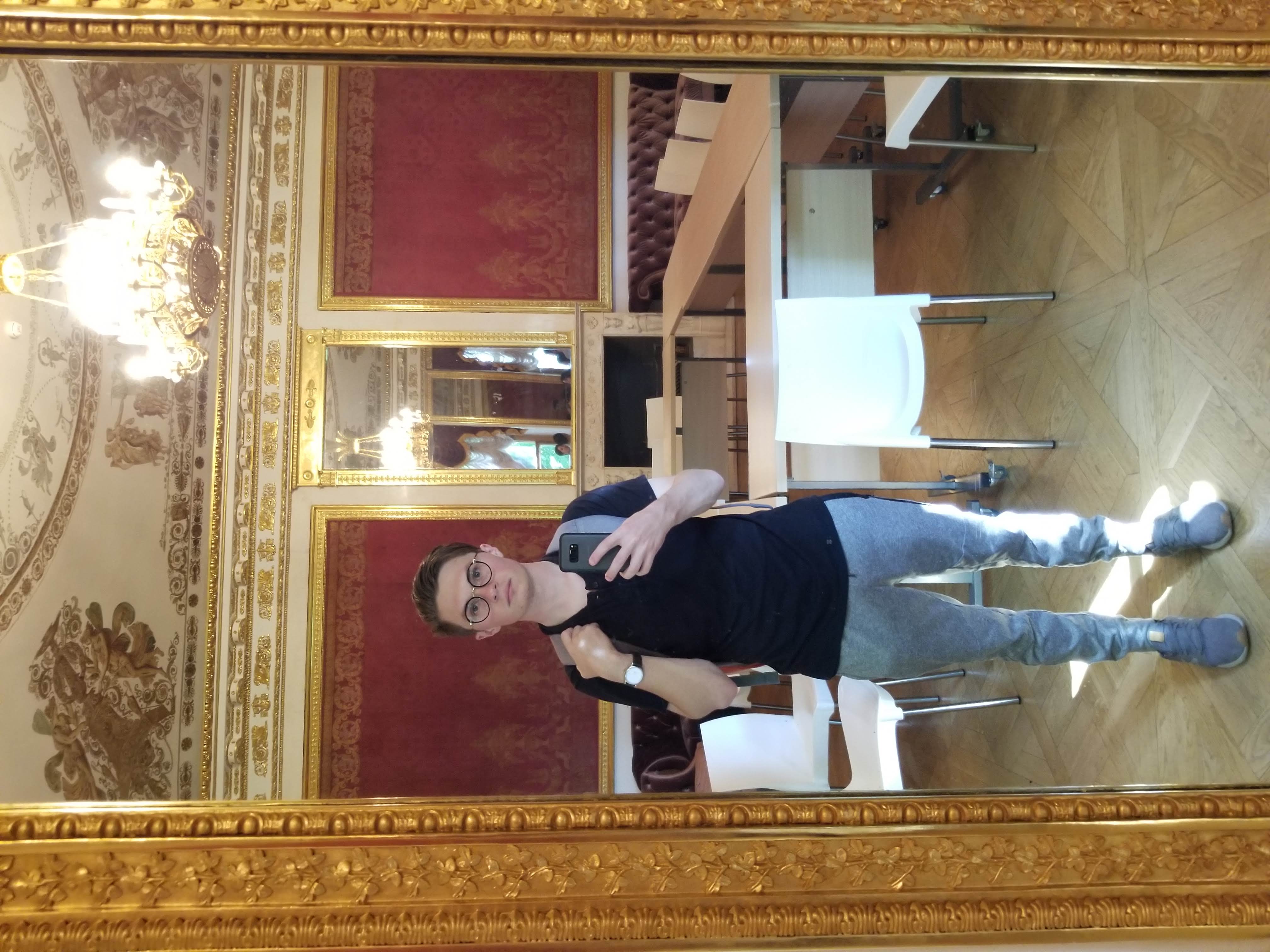
William Leahy '20
“Do what you love, and you’ll never work a day in your life” may be cliché but it certainly proved true for me in my college career. My academic career did not begin at SUNY Oneonta in the history department, but I wish it had. Before I arrived at Oneonta, I pursued a degree in nursing at SUNY Delhi. There I learned useful talents in that field. Yet I was doing what I did not love in the slightest. After finishing my short stint in nursing school, I decided to pursue what I truly loved: history. That is what brought me to Oneonta, and though I only stayed at Oneonta for two years, my opportunities and experiences were beyond rewarding.
At Oneonta, I discovered how to take my love for history and apply it in a useful and meaningful way, while at the same time greatly expanding my knowledge of the field. Under the guidance of Professors Hendley, Malikov, Ashbaugh, Goodier, Freeman, and Harder I was introduced to British, Russian, German, French, American, Japanese, and New York state history. The professors guided and nurtured my writing abilities, vastly improving them. Under Dr. Goodier, I gained invaluable experience as a teaching assistant, and with the guidance of Dr. Malikov and Dr. Hendley, I spent most of my time at Oneonta working as a research assistant.
As a research assistant, I learned how to ask important questions about history and to research the answers to those important questions on my own as a student of historiography. An incredibly valuable undergraduate experience as a research assistant for me was editing Dr. Malikov’s book, Central Asia: A Primary Source Reader. Under the guidance of Dr. Goodier, my work as a teaching assistant improved my skills in presenting and transferring information to other students. My classroom experiences with my history professors were positive and exciting. All these experiences culminated in my senior thesis on mui tsai (translated as “little sister” in Cantonese and is a women’s indentured servant tradition in China) in Hong Kong.
My senior thesis was under the guidance of Dr. Hendley, and I was able to leave the classroom to research my topic. With his guidance I traveled to Cornell University and the University of Toronto and researched mui-tsai in Hong Kong during 1918-1940. The thesis focused on the social dynamics of the city – a clash of western and eastern cultures – and how this clash sparked a debate over a Chinese tradition. The debate over mui-tsai created a prism from which the political machinations of the empire and the social expectations for colonies can be examined. Writing and defending my senior thesis successfully was one of the last things I did at Oneonta, before moving to new experiences.
Since graduating from SUNY Oneonta, life has been nothing short of eventful. I embarked on an exchange program to Russia and decided to further my education there. Currently I am a master’s student at Moscow State Institute of International Relations (MGIMO) in Moscow, Russia. The experience has been marked by the drastic differences in the educational approach, culture, and the current pandemic. Russian borders were initially closed, so I spent my first two semesters studying online while living in Serbia, Ukraine, Montenegro, and Armenia. Finally, the borders opened, and I was able to complete my studies at MGIMO. Currently, I am preparing to depart from Russia, and for the next three months I will be an intern at United Nations Industrial Development Organization headquarters in Vienna, Austria. The application process was complex and competitive, and the acceptance to the internship program was partially due to the various research experience I had gained at SUNY Oneonta. While in Vienna, I will work with the department focusing on Europe and Central Asia development, while also completing my thesis for MGIMO titled “Arctic Region in Russian Foreign policy: External Dimensions”.
As I reflect on my time spent at SUNY Oneonta, I am amazed and extremely grateful for the knowledge and skills that I have gained, as well as the academic transformation that took place in me. I am grateful to all the dedicated professors that invested so much time and energy into sharing knowledge, experiences, and valuable career skills with me, knowing this will be of immeasurable use to me as I move forward in life and prepare to enter the work force.
Emily Leger '19
After graduating from Nassau Community College with a degree in Liberal Arts, I knew I was ready to take the next step in my academic journey and pursue my bachelor’s degree in History at SUNY Oneonta. When I joined SUNY Oneonta’s History Department in the Fall of 2017, I was unsure of exactly where I wanted my career to go next. Thankfully, I was not lost for long, as the environment at SUNY Oneonta provided me with both the space and opportunities to discover my passions in life, and the resources and guidance to pursue them.
One of my favorite parts of being a History major at SUNY Oneonta was being part of the History Club. As a transfer student living off campus, I was excited for the opportunity to meet and relax with people with similar interests outside of class. I was a member my entire two years at Oneonta and served as Secretary for two semesters. Our weekly meetings were always a good time, but the highlight of every semester was the end of semester weekend trip. We took entirely student led overnight trips to places all over the Northeast, such as to Salem and Boston, Massachusetts; Washington DC; and Newport, Rhode Island to visit museums and historic sites that interested us. Organizing these trips and visiting these cities with a group of classmates-turned-friends gave me a sense of real independence during my college experience.
Being part of SUNY Oneonta’s History department allowed me to travel a considerable amount. In the Spring of 2018, I also had the privilege of attending a faculty-led overseas course and traveled to Norway and the United Kingdom for two and a half weeks with Dr. April Harper’s Norman Conquest class. We visited Viking village sites and ship museums in Oslo and York, traveled to a monastery that Vikings raided on the Holy Island of Lindisfarne, and toured the seat of the first Norman King of England at the Tower of London. It was truly an unforgettable experience and I am so grateful to Dr. Harper and to Karen Munson, SUNY Oneonta's Employee Assistance Program coordinator, for all their hard work to make that trip possible.
Besides providing a wonderful undergraduate experience, SUNY Oneonta’s History Department was also instrumental in shaping my future career path. I had transferred to Oneonta because I knew I was interested in History but was not sure where that could eventually take me. The class that started me on my current path was a Spring 2018 Special Topics class called Intro to Public History with Timothy Duerden, Director of the Delaware County Historical Association. Through this class I learned that there were other ways to be an educator besides being a teacher, including working in museums. I am glad I was able to take advantage of the History Department’s relationship with other local educational organizations.
I also took SUNY Oneonta’s advanced seminars with Dr. Julie Freeman, who specializes in the history of Nazi Germany and the events of the Holocaust. In the Fall of 2018 Historiography Seminar, we learned how to research historians’ credentials and to examine the factors that may have impacted their research and writing, such as their education or field of expertise, political affiliation, or personal involvement with a person or event. We asked where their information was coming from, if it was from a reliable source, and determined if their interpretation made sense in the context of other historians’ findings. Determining this information helped us learn how to select credible and reasonably unbiased secondary sources to support our arguments. Our assigned readings of one book per week, on average, also taught me valuable time management skills, as well as how to read a book while asking the aforementioned questions to synthesize the main points, rather than to absorb every word. All these skills have served me very well in graduate school.
In Spring 2019, I took the Research Seminar with Dr. Freeman. We had honed our research and critical thinking skills in Historiography, and now it was time to apply what we had learned and produce our thesis papers. I have found that the style and pace of these seminars really helped prepare me for graduate school. This transition from researching and absorbing content to synthesizing my own ideas about the historiography of the Holocaust mimics the transition between undergraduate and graduate school; that is the transition from focusing on learning content to learning how to communicate that content clearly, effectively, and ethically to audiences both inside and outside of traditional academia. The Historiography Seminar gave me the tools and skills to be a good historian and citizen in general, and the Research Seminar allowed me to practice and develop those critical thinking and communication skills that are so important in graduate school and in life. Dr. Freeman also taught me the value of empathy in history, and in trying to provide accurate and appropriate interpretations of terrible historic events such as the Holocaust. Learning how historians navigate the need to face and interpret difficult histories was an inspiring and life changing experience for me. Dr. Freeman was also one of my biggest supporters while going through the rigorous process of applying to graduate schools. I will always be grateful for the time and resources that she shared to prepare me for my future.
It was SUNY Oneonta’s connection to the Cooperstown Graduate Program for Museum Studies that really opened a lot of doors for me. The History Department provided multiple opportunities for students to interact with faculty and students from Cooperstown, as well as other local museum professionals, at panels and workshops. After one particularly inspiring panel with Danielle Henrici, former Director of Education at the Fenimore Art Museum, I began the process of setting up an internship with the museum in the Spring of 2018. I worked with Dr. Mette Harder and Kevin Gray, Manager of Arts Education, to organize and complete an internship in the Fenimore’s Education Department during the Summer of 2018, for which I earned course credits. This internship gave me invaluable hands-on experience working in a museum and led to part time employment at both the Fenimore and the Farmers’ Museum in Cooperstown, which continued into the Fall of 2019. My relationship with the museums continues to this day, two years later. My time at the Fenimore really solidified my interest in museum studies and gave me the confidence to apply to the Cooperstown Graduate Program. With the support of Dr. Freeman, Dr. Harder, and the rest of the History Department, I was accepted into the program, and began working towards my master’s degree in the Fall of 2019.
Although I was a bit of a late bloomer when it came to college, SUNY Oneonta’s History Department really helped me find my way once I got here. Their different special topics classes allowed me to take interesting classes not often offered at other colleges. It was a treat to take History of Anime and Manga with Dr. William Ashbaugh my final semester in Spring of 2019. And although Introductory Latin may be offered at other colleges, I can guarantee that no one teaches it quite like Dr. Akira Yatsuhashi, who kept us engaged with good humor and Roman legion formation demonstrations in the Spring of 2018. I will always remember the creativity and passion of professors at SUNY Oneonta. The variety of History classes offered at Oneonta helped me see that there are more ways to be a professional historian than just the traditional academic route of publishing books or becoming a professor.
The department's genuine commitment to seeing its students succeed helped me graduate Summa Cum Laude in Spring of 2019, with the academic achievement of Outstanding Senior in History, and as a member of Phi Alpha Theta, the National History Honor Society. Today, I am on track to graduate with a master’s degree from a nationally renowned museum studies program, pursuing my dreams with some of the best minds in the field. I would not be where I am today without the guidance, resources, and opportunities that came with being a part of SUNY Oneonta’s History Department.
Emily Leger, Cooperstown Graduate Program, class of 2021
Natalie Reyes '18
I began my Oneonta journey as a 3+1 Fashion Design major in 2015. Since I love to draw, I thought it was what I wanted to pursue for my future. My journey as a history major didn’t begin until my sophomore year. I realized I wanted to pursue my degree in history after speaking to a history major student who was a teaching assistant for Dr. William Simon’s U.S. History course. I had taken this course for the Spring semester my first year. This student had realized that I was very interested in the history of women and people of color. He suggested I look into majoring in history, as well as completing a minor in either Women and Gender Studies or African and Latino Studies.
This was a huge transition for me. I ended up changing my major from fashion design to history and minoring in Women and Gender studies. Every class I had taken, I was always determined to research the stories of women. I took classes such as Women and Women’s Movements in the U.S., which gave me the opportunity to publish a short autobiography on a woman who participated in the suffrage movement; the History of Slavery, which taught me about the history of people of color including women of color; and other similar courses. Junior year is when I began doing more research on women of color. I decided that becoming a research assistant for Dr. Susan Goodier for my two semesters would help me improve my research skills. But I learned how challenging it can be to research women of color. I even got the opportunity to travel for further research with Dr. Goodier during my spring semester. She taught me what we had to do in advance when visiting certain places for research, some of the rules that are included when doing this kind of work, to examine documents, how to document sources, and so forth. It was worth the many trips because we ended our last day finding a signature and an address of Harriet Jacobs’ daughter.
Although the years went by fast, my last year ended being quite satisfying. Dr. Mette Harder recommended that I submit my historiography paper to the Maynard Redfield History Essay Competition. Surprisingly for me, I actually won the long historiographic essay award which I am very proud of. Also, I had the opportunity to attend the Life of the Mind event with Dr. Goodier to speak to many people about the research we had done for the Fall of 2017 and Spring of 2018 of Harriet Jacobs’ daughter. I decided that the path I wanted to pursue for my Master’s degree would be in Museum Studies. My year ended by getting accepted into the Cooperstown Graduate Program for the Fall of 2019. I recently completed an internship at the Dyckman Farmhouse Museum in Inwood, New York. I’ve decided that I enjoy doing Community Engagement work for museums, which includes doing research on the museum’s history. I have never regretted making the huge transition from fashion to history. I started off not enjoying history due to the way I was always taught before I got to Oneonta. The people in the history department taught me the challenges that come along with the history we choose to research, as well as the many opportunities that come with graduating with a history degree.
Matthew Hitchen '16
The History Professors at SUNY Oneonta prepared me in a number of ways for life after Oneonta, but most importantly, they made me a better researcher. Originally, I majored in Political Science, however, I quickly progressed through the major and realized I could pick up a second major during sophomore year. The History department at Oneonta advertised a wide range of courses that caught my attention and I picked up a new major. As a new student of History, I was drawn to courses I knew nothing about. For example, I took two classes involving Russia, the Soviet Union, and Central Asia all taught by Dr. Malikov. These unique courses analyzed events, ideologies, and cultures far removed from the average American. In short, these classes opened up a new world.
As a History major, I excelled in 200 level courses for sophomores and above. Two Professors in particular solidified my interest in History. Dr. Noorlander, who specializes in eighteenth century American and Dutch history made me a better writer and thinker. His course on the American Revolution had the most lasting effect on me, thereafter I found myself intrigued with eighteenth century North America. Another influential Professor, Dr. Hendley, who specializes in nineteenth century British History pushed me to work slower and be meticulous. As a result, he finely tuned my research skills. I took historiographic and senior seminar with Dr. Hendley in senior year. These classes focused on the Industrial Revolution and had numerous assignments that included a primary source analysis, historiographic research project, and a final research essay that for me spanned forty pages. These tough assignments had a profound effect on me. Overall, I matured as a student of History.
After graduation I took a year off and in November of 2017, I began working on a series of proposals for a number of graduate schools. Since I was applying to competitive universities I had to find a truly original topic. Of the many proposals I came up with only one was unique and original. In this three-page proposal I outlined a project tracing Scottish migration in North America in the early eighteenth century. Many of the towns I grew up around in upstate New York have Scottish names. Historians know that Scots began to settle in the 1700s, yet they don’t know when exactly. My aim is to find out who these Scottish settlers were and why they came. I also theorize that the openness of Dutch colonial society worked to the Scots advantage. By the end of the eighteenth century Scots outnumbered the older Dutch and native populations.
In mid-April Washington State sent an unconditional offer for a MA in History. Fortunately, I had a competitive GPA and enough research experience for Washington State to offer a tuition waiver and a TA position. In August, 2018 I will begin working on my MA under the supervision of Dr. Lawrence B. A. Hatter. I look forward to studying in Washington and I thank the Professors at SUNY Oneonta for preparing me for this new adventure.
Giovanna DiFilippo '16
When I began my first day at law school, I was immediately grateful that I decided to experiment in the History major during my sophomore year. The workload in law school is immense and it feels as though the research and reading will never end. But I can truly say that I was well prepared. As a History major, you will be expected and required to sift through relevant historical text, learn how to craft an analysis of the text and engage in debates using your historical knowledge. In addition to these skills, you will also obtain and refine your writing style. In my last semester at SUNY Oneonta, I was invited to complete an internship as a Research Assistant for New York History with Dr. Noorlander. The History department faculty and the New York State Historical Association edited this peer-reviewed journal. By completing this assistantship, I was able to experience what goes on behind the scenes of writing and editing scholarly works. During this last semester I also became Dr. Beal’s teaching assistant for his freshman class. Being a teaching assistant was fun, and I enjoyed helping the new students tackle their academic challenges.
I was also a member of Phi Alpha Theta, the national historical honor society at SUNY Oneonta. This honor went beyond good grades and tassels. Receiving this honor proved that I was able to overcome the difficulty of raising a low GPA to one that could receive academic recognition. From this I learned that you should always pursue what you are drawn to. Never force yourself to pursue something because you perceive it to be the “safest option.” Taking Dr. Hendley’s historiography course, Imperialism and Popular Culture in Modern Britain, was the most demanding course in my undergraduate experience and required me to use every skill I developed. I was proud of the final paper I wrote for the course, entitled “The Unsung Heroines of the British Empire.” It won honorable mention within the History Department and was published in SUNY Oneonta’s first edition of SUNY Oneonta Academic Research (SOAR): A Journal of Undergraduate Social Science. I presented this essay at the Phi Alpha Theta conference in the spring of 2017. SUNY Oneonta’s History Department hosted the conference and students from a variety of colleges submitted their work and attended the event to present their unique historical research. This was another character-building experience for me because I was never keen on public speaking. However, presenting something you are passionate and knowledgeable about reduces that fear.
I am eternally grateful that SUNY Oneonta has an outstanding History Department. The faculty was approachable, and I never found myself lost or uncomfortable in class. Office hours proved to be valuable assets in understanding course materials and also in getting to know your professors. If I could go back in time, I would never have signed up for something I had minimal interest in, no matter how many eye rolls I could have avoided.
Since obtaining my History Degree at SUNY Oneonta in December of 2016, I received my Juris Doctor from the Elizabeth Haub School of Law at Pace University in May of 2020 and I have since passed the New York Bar Exam.
Miles Jahnke '16
My name is Miles Jahnke and I graduated from SUNY Oneonta in 2016 with a degree in Criminal Justice and History. Currently, I am in pursuit of master’s degree in Criminal Justice at the University at Albany (SUNY Albany). With passions for history and the social sciences, I decided to switch gears after completing one year in Binghamton University’s engineering program, and transfer to SUNY Oneonta in 2013. The History Department at SUNY Oneonta enabled me to indulge these passions, specifically by granting me the opportunity to take fascinating classes in subjects such as the Enlightenment, the American and French Revolutions, medieval medicine, the Central Middle Ages, and the histories of Soviet Russia, Canada, and Latin America before Columbus. Yet, what really prepared me for graduate school and for my life beyond SUNY Oneonta was not necessarily the content of these courses, but rather the skills that I acquired while taking them.
Of particular importance was the development of my reading and writing skills in the program. If one has any hopes to do well in SUNY Oneonta’s History program, one must learn how to read large amounts of information and extrapolate the primary themes, analyses, and theses found within multiple sources. Furthermore, one must learn how to take this information, critically analyze it, and use it in one’s own written and oral arguments. For example, I utilized this skill to write several research papers on various topics, including on the history of African American poverty and the racial discrimination that African Americans have faced, the historical role of shamans in Andean culture, and the differing ideologies of the United States and Soviet Union, and their impact on the Cold War. A paper on Canadian gun control made me the winner of the History Department’s Maynard Redfield Short Essay contest. I also won the History Department’s Maynard Redfield Student Award for my contributions to the History Department and the Academic Achievement Award in Sociology. Not only did my reading and writing skills lead to success during my undergraduate studies – their acquisition has well equipped me for the copious amount of reading and writing needed in graduate school and the increased amount of critical thinking needed for assignments and discussions.
Some of the helpful skills that I acquired from SUNY Oneonta’s History Department involved specific faculty members. For instance, Dr. Mette Harder, especially during her Old Regime and Enlightenment class that I took in my first semester at SUNY Oneonta, significantly improved my communication and oral argumentative skills during our small group discussions. Her warm and friendly demeanor, coupled with her genuine and serious interest in the subject material, created an inviting and intellectual class atmosphere. Despite my initial shyness, her class prompted me to really come out of my shell and have confidence in both myself and my arguments.
My ability to edit and analyze written works, particularly historical journal articles, heavily derives from my experience with Dr. Thomas Beal. As a research assistant for Dr. Beal and New York History: A Quarterly Journal, I learned much about the journal editorial process, including how to examine a journal article in terms of thesis clarity, the sources used to support the author’s argument, and the structure of the article. These skills have proven to be extremely helpful in graduate school. Not only has it become necessary for me to analyze various works, but it is vital that I critique the credibility of their sources.
I fondly remember my time in SUNY Oneonta’s History Department not only because of the phenomenal faculty and staff, but because of the experiences I had with my fellow students. As part of History Club, I had the opportunity to engage in two historical travel trips to Washington, DC and Boston, MA where we went to museums, observed the historical architecture and monuments of the cities, and made some excellent memories. Furthermore, I had some great times on campus as well with the History Club, participating in fun historical activities during meetings and going to movie nights in the Red Dragon Theater to see Selma and Marie Antoinette. I had such a great time that I became the History Club President during my last semester.
My time in SUNY Oneonta’s History program was time well spent. Not only did I develop skills that I believe have made my transition to graduate level work easier, but I fostered great friendships throughout my time in the program. While SUNY Oneonta is not a large research university, undergraduates receive individualized attention and education that helps one grow and develop as both a person and an academic. I am proud to have been a History Major at SUNY Oneonta!
Jerrad Pacatte '16
I was fortunate to have grandparents on both sides of my family who understood the infinite beauty and importance of history. When I wasn’t swimming or spending time with cousins, I spent my summers rummaging through my paternal grandparents’ late-eighteenth century farmhouse or visiting historical landmarks, Civil War battlefields, and museums with my grandmother (a retired history teacher) and grandfather. On my mother’s side of the family, my siblings and I grew up attending pow-wows, learning to weave sweetgrass bookmarks and baskets, and listening to stories about our Native American ancestors from my grandmother, an Abenaki Native American and professor emerita of Native American Studies. Looking back on it now, I come from a long line of historians. So in many ways, I guess it only makes sense that I eventually became a historian, too.
I came to SUNY Oneonta in the fall of 2013 to become a high school social studies teacher. As one of, if not the, best preservice teacher education program in the state of New York, students majoring in Social Studies Adolescent Education at SUNY Oneonta are required to take a number of upper division history courses. While I found various aspects of pre-modern history intriguing - from the history of Ancient Rome to the history of Medieval sexuality - I always found myself gravitating towards courses in American history. When planning my course schedule for the fall of 2014, a catchy course title caught my eye: the “History of American Crime and Prisons,” taught by Dr. Leigh-Anne Francis. This course, and its instructor, literally changed the trajectory of my life. By utilizing an intersectional approach, i.e. scrutinizing the historical record by analyzing the race, class, gender identity, sexual orientation, and other intersecting social identities of historical actors, my classmates and I unraveled the institutional and societal systems of oppression which have worked against marginalized populations in the U.S. throughout history and in the present day. I fell in love with African American history thanks to Dr. Francis and this course, a debt I fear I may never be able to fully repay.
The History Department at SUNY Oneonta permits upper-level students, under the supervision of a history professor or instructor, to conduct their own independent research projects for academic credit. These “independent studies” are tailored to the individual historical interests of students and offer an excellent opportunity to build relationships with faculty while also exposing students to the process of conducting primary source research. During the spring 2015 semester, I completed my first independent research project examining the history of racial violence in New York State after the Civil War under the supervision of Dr. Leigh-Anne Francis. This project, in addition to a term research paper I crafted in Dr. Mette Harder’s “French Revolution and Napoleon” course which explored the influences of eighteenth-century French gender discourses, patriarchy, and poverty as the prevailing causes of female prostitution during the French Revolution illuminated the allure of historical research and the intellectual satisfaction gained from answering questions left unanswered by existing historical scholarship. By the fall of 2015, I made the decision to switch my major from Social Studies Adolescent Education to History. By then, I had made up my mind: I wanted to become an academic historian.
Aside from its vast course offerings, seasoned faculty, and extracurricular organizations including the Phi Alpha Theta Honor Society and CLIO History Club, both of which I assumed an active role in while at Oneonta, the department’s longstanding commitment to studying the past via an interdisciplinary approach allows students to enroll in courses across the humanities and social sciences. In other words, history courses are frequently cross-listed with those taught by faculty in the departments of Africana-Latino Studies, women and gender studies, political science, and sociology among others. Taking courses outside of the history department introduced me to lifelong friends and professors with whom I still maintain contact. I would highly encourage all students majoring in history to take advantage of these incredible learning opportunities! While at Oneonta, I also worked with Dr. Thomas Beal as a peer editor for the New York Quarterly journal and in my last semester, I had the great fortune of serving as a teaching assistant for Dr. William “Bill” Simons’ U.S. History I course. In the spring of 2016, I graduated a year early and with highest academic honors (summa cum laude) with a Bachelor’s of Science in History.
It’s somewhat hard to believe that I graduated from SUNY Oneonta nearly four years ago. After leaving Oneonta, I began the second chapter in my journey of becoming an academic historian as a Ph.D. student in the Department of History at Rutgers, The State University of New-Jersey-New Brunswick studying African American and Women’s and Gender History. A powerhouse for the study of African American and Women’s and Gender history, I’ve been blessed to work with a number of leading historians of African American women’s history while at Rutgers, among them my brilliantly kind dissertation advisor, Professor Erica Armstrong Dunbar. Although infinitely challenging, both personally and intellectually, the decision to pursue my Ph.D. remains one of the best I’ve ever made. After completing all required coursework credits, and successfully passing two qualifying examinations, I officially became a Ph.D. candidate in November 2019. I have since relocated to Providence, Rhode Island, to complete the research and writing of my doctoral dissertation which examines the lives and labors of enslaved and freed African American women in late-18th and early-19th century New England. I have published peer-reviewed book articles in the New York Quarterly journal and on the H-Net website. And in April 2020, a chapter I co-authored will be published in the anthology Scarlet and Black Volume 2: Constructing Race and Gender at Rutgers, 1860-1945, co-edited by Deborah Gray White, Marisa Fuentes, and Kendra Boyd (Rutgers University Press, 2020). When not working on my dissertation, I am also a regular contributor to the New Books in African American Studies podcast, a channel on the New Books Network [be sure to follow the New Books in African American Studies (@NewBooksAfroAm) and New Books Network (@NewBooksNetwork) on Twitter and Facebook!] After graduating from Rutgers with my Ph.D., I am strongly considering attending law school with the ultimate goal of becoming a tenured professor of history or constitutional/civil rights law. I eagerly welcome inquiries from history students who are considering applying to graduate programs in history! Please send all emails to: jpp158@history.rutgers.edu.
In all, the importance of our field and becoming a student of history looms beyond a chronological understanding of past events. History is so much more than just time – an alluring mystery we as historians crave to unravel and explain. It offers a glimpse at the roots of who we are as a people, and more significantly, where we stand today. In an era in which disproportionate numbers of unarmed people of color are slain by police or housed in “prisons for profit,” an era when thousands of Americans are being denied basic Constitutional rights including the right to vote in states including Georgia and Wisconsin, and as the civil and labor rights of LGBTQ people hang in the balance pending litigation in the Supreme Court, we must not ignore the voices of the past in our quest to craft a brighter, safer, and more just future.
Hunter Reed '16
My name is Hunter Reed and I received my Bachelor of Science in History in May 2016, with a minor in Women’s and Gender Studies. During my undergraduate career at SUNY Oneonta, I was fortunate to work with many incredible professors who pushed me to excel in ways I never imagined I could. I began my academic experience as a biology major and by taking my general education requirements. One of these requirements was History 100, or Western Civilizations. I had heard through friends that this class was terrible, boring, and otherwise unengaging. They could not have been more wrong. I was privileged enough to take Western Civilizations with Dr. April Harper, and I can honestly say that this class changed my life. It helped me rediscover my love for history and realize I was much more interested in historical research than science labs. Within the first month of my first semester at SUNY Oneonta, I chose to change my major to history and I never looked back.
During my time as a student in the History Department, I also got the chance to take Medieval Sexuality (Spring 2014) and Boys to Men: European Masculinities (Fall 2014). Both of these classes helped me engage in my curiosity about gender and eventually led me to pick up a minor in Women’s and Gender studies. Boys to Men was one of my favorite courses and was taught by Dr. Mette Harder, who became one of my strongest mentors. It explored the characteristics of masculinity in the changing European context between the 1500s and the 1900s. It helped me engage in historical debate, as this class had only six students and was taught entirely through discussion. That is definitely one of the perks of studying at SUNY Oneonta: the average class was twenty students or smaller.
Following my experience in Boys to Men, I worked as Dr. Harder’s research assistant in the spring of 2016. In the previous fall semester, we worked on an application to the Student Grants Development Office to fund a research project on Jean-Paul Marat (1743-1793), a French Revolutionary. I ended up receiving enough money to cover my books and research materials and go on research trips to Cornell University’s Karl A. Kroch Library. Here, I got to work with primary documents from the French Revolution in an archive setting. This was an incredible opportunity for a budding historian like myself. The project culminated in my presentation at Student Research and Creative Activity Day, a school sponsored research showcase. My project received the Honorable Mention Award for student research.
I also worked with Dr. Harper on an independent study in fall 2014 involving the depiction of medieval knights in the Arthurian legends and how this related to expectations of masculinity at the time. I furthered this project my senior year during another course with Dr. Harper, Medieval Medicine, by examining the medicine that would have been common for knights to receive. I also looked at the presentation of medicine in the Arthurian legends. I firmly believe that if I ever choose to pursue my doctorate, I will follow a path involving chivalry and expectations of masculinity.
Outside of these two projects, I joined Phi Alpha Theta. This is the national honors society for history. My second year, I presented my paper, “Arthurian Knights: A Study of Chivalry and Homosocial Bonds in the Arthurian Legends,” at the Phi Alpha Theta Undergraduate Research Conference at Marist College. My senior year I was able to work with Dr. Danny Noorlander on the topic of Dutch New York in both my senior seminar class and as an intern for the journal, New York History: A Quarterly Journal. This was a great way to see how journals are put together and edited. I acted as secretary of the history club for a year and helped plan a trip to both Washington D.C. and Boston, Massachusetts. I loved holding this position as I got to interact with students in other disciplines who loved history as much as I did. Where does all of this leave me now? I am pursuing my Master’s degree at SUNY Albany in Secondary Education. My concentration area is social studies. After attending Oneonta’s history program, I feel completely prepared to start this new journey. I will truly miss all of our incredible faculty and staff who give so much of themselves so that we can continue to learn. I hope someday I can positively impact my students as much as my professors here did me. I am truly grateful for the opportunity to study history here at SUNY Oneonta.
Luke Murphy '15
My name is Luke Murphy and I graduated from SUNY Oneonta in spring 2015 with a degree in History. I began my career at SUNY Oneonta in fall 2013 as a transfer student and I will remember my time here fondly. As an undergraduate, I took classes in Russian, Soviet, and Central Asian history with Dr. Yuriy Malikov, Diplomatic and Japanese history courses with Dr. Bill Ashbaugh, courses on the Holocaust with Dr. Julie Freeman, and a course on the Early Middle Ages with Dr. April Harper. I also had the opportunity to serve as a Research Assistant with Dr. Thomas Beal for New York History: A Quarterly Journal and serve as a summer intern at the Iroquois Indian Museum. Every professor I have studied underwent above and beyond to help me understand complex topics and to succeed as a student.
Each History course I took at SUNY Oneonta aided me in honing my critical thinking, reading, and writing skills. All history majors take two capstone courses; Historiographic Seminar and Senior Seminar. Students typically take these two courses back to back with the same professor. For my capstones, I had the great pleasure of working with Dr. Ashbaugh on American foreign relations. During my final semester, I completed a thirty-page paper entitled "For the Defense of Britain: An Examination of the Causes of the Economic Restrictions Placed on Japan by the United States between June, 1940 and July, 1941." In this paper, I explored the financial restrictions the United States placed on Japan during the lead up to Pearl Harbor.
There are plenty of extracurricular activities and opportunities at Oneonta for you as a student to exhibit your work and to apply the methods you have learned during your studies. I became a member of the Phi Alpha Theta, the honor society for historians. During both my junior and senior year, I had the opportunity to participate in and present some of my work at the Phi Alpha Theta Regional Conference. Additionally, the History Department hosts the Maynard Redfield History Essay Competition, which I participated in during my senior year. I even received a prize for my work! The history club also offers students the opportunity for anyone interested in history to gather in a fun, inviting atmosphere and go to many historic places. Recently, the club visited Salem, Massachusetts for Halloween, as well as traveling to other historic sites.
I feel that SUNY Oneonta offers the advantages of both a large and small university. As it is a part of the SUNY system, Oneonta students have access to all other SUNY study abroad opportunities as well as Oneonta’s own program. Additionally, our library has five floors filled with books, computer labs, study spaces, and periodicals. Oneonta also has a small school feeling as well. I have a great relationship with every one of the history professors I have studied under and I highly recommend the department for anyone interested in pursuing a degree in History.
Thanks to the support, instruction, and advice of the History Department, I felt well prepared to enter graduate school. I graduated Summa Cum Laude from the Cooperstown Graduate Program in 2017 with my MA in Museum Studies.
I currently work as the Education Coordinator at Hanford Mills Museum. During my time in the history department, I developed an interest in politics and, in November, 2019 I was elected to serve on the city council in Oneonta.
A degree in History provides students with the critical skills they will need in any career field, and I can recommend no place higher than I do SUNY Oneonta’s History Department. I will be forever grateful to the History faculty here for both the support they have given me and the skills they taught me as continue in my career. I wish you the best of luck in the future and sincerely hope you choose to study history here at SUNY Oneonta!
Jodi Oaks '13
After graduating in 2011 with an associate degree in general studies from Mohawk Valley Community College, I transferred to SUNY Oneonta to pursue a degree in History. I have always wanted to go to school to study History, as it has continuously intrigued me throughout my education.
History is an area without boundaries in which you can learn about past events, and how to conduct yourself in the future. Along with this, History examines the development of humans and their relationships through time, which is something I find thoroughly fascinating.
Starting in the spring 2012 semester, I spent two years at SUNY Oneonta as a History major and loved every minute of it. I chose SUNY Oneonta because of its location, affordability, and the welcoming atmosphere I experienced when I visited campus.
At an orientation tailored for transfer students, I met with a faculty member from the History Department who helped me register for classes and better understand the History degree requirements. This eased some of the concerns I had regarding transferring to SUNY Oneonta. I am grateful that I was able to study and work with the excellent faculty in the History Department at SUNY Oneonta. In particular, the late Dr. Dan Larkin, Dr. Yuriy Malikov, and Dr. April Harper. I explored the socioeconomic and political history of the United States in Dr. Larkin’s Gilded Age and Progressivism classes, spurring my interest in labor history. I discovered my love of Russian history in Dr. Malikov’s classes on the History of Tsarist Russia and History of Soviet Russia.
I also got the opportunity to intern as a Research Assistant for New York History, a peer-reviewed journal edited by SUNY Oneonta History faculty in partnership with the New York State Historical Association. Under the guidance of Dr. Thomas Beal, I debated with fellow interns the historical significance of articles that were under consideration for publication in the journal, getting to see firsthand the scholarly conversation. We examined and discussed arguments made in the articles and the evidence used to support these arguments, keeping in mind topics that would interest readers of the New York History journal. Through this experience, I was able to see some of what is involved in writing and publishing History.
My studies culminated in junior and senior seminars with the medieval historian Dr. April Harper, who created a supportive environment that allowed me to develop further my analytical, critical thinking, and writing skills. During my junior seminar, I learned about historiography, or the writing of History, through critically reading and discussing works of History. This also involved writing a historiographical paper. My paper dealt with the massacres of Jewish populations by Crusaders in Europe during the First Crusade and sought to examine revisionist motives of historians concerning these events. I examined sources with the intentions of the authors in mind, along with their individual biases and backgrounds. Through this, I learned the importance of questioning the motives of the authors of these works. Dr. Harper also gave me the knowledge and confidence I needed to pursue graduate studies and pointed out librarianship as a possible career choice. After exploring the opportunities that exist in the library field, I decided to continue my studies in graduate school for library science.
After graduating from SUNY Oneonta in December 2013, I went on to study library and information science at the University at Buffalo, with the goal of becoming an academic librarian. I graduated with my master’s degree in May 2015 and I am now working at Milne Library at SUNY Oneonta as a reference and instruction librarian. In my current position, I use the skills gained through my undergraduate studies on a daily basis. This includes critical thinking, effective communication, both written and orally, and research skills. As a reference and instruction librarian, I teach the basics of library research to undergraduate students. This includes how to locate and evaluate information. When discussing the evaluation of sources, I stress the importance of thinking about authority and purpose. Authority refers to the source of the information and involves examining aspects like the author and publisher. Evaluating purpose requires questioning why the information exists in the first place. What were the intentions of the author, to inform, educate, persuade, entertain, or sell? My work as a History undergraduate trained me to think critically when evaluating information sources and my History degree gave me a solid foundation on which to build on these skills through graduate and professional work.
The following are some words of advice to potential and current History majors. Use your time at SUNY Oneonta to explore and find something for which you are passionate. The wide-ranging expertise of the History faculty at SUNY Oneonta gives you a variety of areas to study that span diverse geographical locations and time periods, from ancient to modern history. Consider an internship. Internships give you a chance to actually apply what you learn in the classroom, possibly find a profession you want to pursue after graduation, and help you make valuable connections. Lastly, talk to your professors! They are incredible sources of knowledge and expertise. As a History major at SUNY Oneonta, you will benefit from a supportive department that truly wants to help you succeed in your academic career and beyond.
Katie Perrotta '06
My experiences in the SUNY Oneonta History Department laid the groundwork for my 15-year teaching career. The courses I took and extracurricular activities the History Department offered with the History Club prepared me for teaching history and social studies in middle school, undergraduate, and graduate settings. When I started my undergraduate studies at SUNY Oneonta in the fall of 2002, I did not intend on majoring in history. I initially majored in secondary education and French, but I found that my passion was to teach history, particularly after 9/11 when the world seemed like a very confusing place.
I switched my major to secondary education major with a concentration in social studies. As a social studies major, I had to take several history courses that had an indelible impact on my professional life. One of the first courses I took was one on the American Revolution and the early republic with Professor Francis Rodriguez. He assigned Gordon S. Wood’s book The Radicalism of the American Revolution, and I found it to be one of the most intriguing books on a topic I did not think was interesting. In fact, this book was probably the first historical book I seriously read, and I realized that I was intellectually capable of reading books written by professional historians. Professor Rodriguez was a dynamic instructor who symbolized the effectiveness of the History Department’s full-time and part-time faculty.
I took several courses in U.S. and world history for my education degree that further contributed to my interest in history and teaching history. I always liked British history and culture, and Dr. Hendley’s course on Tudor England was so intriguing, particularly the tumultuous reigns of Henry VIII, Queen Mary, and Queen Elizabeth. When I graduated in 2006, my best friend at SUNY Oneonta, Bethanie Mason, and I went to London, and I was so happy to experience the history I studied in Dr. Hendley’s course. In particular, we visited Buckingham Palace, Kensington Palace, Hyde Park, Westminster Abbey, and the Tower of London. Additionally, Dr. Harper’s course on ancient Rome was fascinating, mainly because she couched her lectures in primary source analysis. The greatest impact Dr. Harper had on me was a comment she wrote on a paper of mine, stating that I should consider pursuing a Ph.D. At the time, I never thought such a pursuit was possible, but those comments stuck with me, and her encouragement led me to consider a career in higher education.
Dr. Beal’s New York City history course completely transformed my life. Growing up in the city, I did not know about the role slavery played in the founding of the city, particularly the case of the 1741 slave rebellion. I learned about racial discrimination and the socio-economic and political complexities of 19th century New York before and during the Civil War, particularly with reading Gangs of New York and studying the 1863 Draft Riots. Also, Dr. Beal assigned us to write a review of a book on NYC history. I read Fat of the Land, and learned about how the placement of landfills throughout the boroughs, especially in Staten Island, had major ramifications for the physical expansion of the city, construction of interstates under Robert Moses, and environmental impacts on the city. I also took Dr. Beal’s course on Jeffersonian Democracy where I learned how to read historical research from a critical lens after reading a biography on Jefferson, as well as why the use of primary sources are vital for doing historical research.
The History Department remained an important part of my life after I completed my undergraduate degree. Dr. Beal assisted me with my application to CUNY Staten Island where I pursued my Master’s degree in History, which put me on a path to pursue my Ph.D. in Teaching and Learning in Social Studies Education at Georgia State University (which he and Dr. Harper both supported my work during my doctoral program). Dr. Harper also remained a mentor during my time in graduate school, and she advised me on publishing my work. My dissertation was a qualitative case study in which I examined how middle and high school students demonstrated evidence of historical empathy through analysis of primary sources about Elizabeth Jennings, who was an African American teacher in the segregated schools of the NYC DOE who was ejected from a segregated streetcar in Manhattan in 1854. She sued the company with Chester A. Arthur as her lawyer, and won. My continued interest in matters of social justice and the continuum of Black history in the history and social studies curriculum is directly attributed to the education I received in the SUNY Oneonta History Department.
I learned how to be a professor from my professors who were always available to answer my questions, provide feedback, and offer sound career advice years after I graduated. I currently am an Assistant Professor of Middle Grades and Secondary Education at Mercer University Tift College of Education where I teach courses in social studies methods, middle and secondary curriculum and instruction, and curriculum theory in the M.A.T. and Ph.D. program in Curriculum and Instruction. I love teaching history, and I love working with teachers who believe in the importance of history education. Teaching is a scholarly apprenticeship, and I am fortunate that I received this type of education from SUNY Oneonta history professors as I engage in academic publishing, service, and teaching.
Stacey Huber '04
When I enrolled at SUNY Oneonta, I was bound and determined to be a Home Economics teacher. I had never been one of those people who knew as a child what career was for them. However, I had excelled in Home Economics in high school and figured teaching was a solid career choice. Oneonta State was one of the few places in New York offering the program so there I went.
My first semester I was enrolled in EDUC106, “Issues in Education”. I remember the Professor saying at the end of the drop period, half of you will leave, those that remain, half of you will decide you do not want to be a teacher. Right, she was! This was not what I wanted to do with my future. At the same time, I was taking HIST145, US History II with Professor Matthew Shea. The class and teacher was engaging and enlightening. Now this was right up my alley! So much so that I was tutoring fellow classmates on my dormitory floor who were struggling with the class. I knew I liked history and sharing with others but I did not want to be teacher. As I continued to take the required classes for the General Education aspect of my degree, I kept taking more history classes every semester. Eventually, I decided to major in it. Because, why not? Friends and family asked what would I do with it? Teach? No…I knew that much. I briefly considered the graduate program in Museum Studies but was not in a place where that was a viable option.
After graduation, reality hit and employment was needed. Instead of coming back to Western New York, I stayed with local friends and started working at the Farmer’s Museum in Cooperstown in their interpretation department. I stayed for two seasons until a friend back home informed me Genesee Country Village & Museum in Mumford, NY was hiring. So, back home I came. I loved working as a costumed historical interpreter, surrounded by restored buildings, great artifacts and sharing my love of history with the public. Many times, in fact, while discussing life in the Victorian era I would reference things learned in Dr. Thomas Beal’s, HIST 294 ‘Labor & Leisure’ class, especially P.T. Barnum. However, seasonal part-time does not pay the bills, especially the college loans so I said good-bye to that life. Clerical work in medical offices as patient care coordinator and receptionist roles became my employment, but my love of history would not go away. This past spring, I was able to fulfill a dream I did not even know could be reality, and joined the workforce for the county of Wyoming as their assistant historian. Now I get to share my passion with not only the residents of my home county but others as well.
My time at Oneonta taught me much. Who knew all that research and writing would come in handy and be part of my everyday life. We (the Wyoming County Historian’s office) publish a quarterly magazine in which I now play the roles of writer, editor, assembler, and mailer. Valuable skills vital to my career were developed and honed. I’m thankful for the struggles of learning public speaking, engaging your audience and communicating as they all play a large part of my job today. Time management, organization, and attention to detail never go out of style and are used on a daily basis.
While at Oneonta, I took a variety of history classes. These ranged from ‘The Jazz Age and New Deal’ to ‘The History of Slavery’. Classes like, ‘War & Society in Modern Britain’ and ‘Modern Latin America’ kept things interesting. While American history is my preference, I did enjoy my international classes, everywhere from Canada to Germany. I was ecstatic to take ‘History of Canada’ but the professor and I did not mix and I dropped the class. When the previous professor retired and Dr. Matthew Hendley offered it a few semesters later, you bet I signed up for it. Dr. Julie Freeman was an excellent professor whom I enjoyed during ‘Germany: Rise of the Nazis’ and ‘The History of the Holocaust’. Her insights & critiques on my papers still resonate with me today. When the time came to choose a senior thesis class, my options were Hitler or Baseball. I had previously taken back-to-back German history classes and needed a break. So, Baseball it was with Professor William Simons. HIST 394: ‘Baseball & America’, gave me the privilege to do research at the Baseball Hall of Fame in Cooperstown while working on my thesis, “Look Like Women, Play Like Men: The All-American Girls Baseball League”.
Somewhere along the line I discovered CLIO, the history club on campus and joined. Dr. Beal was our advisor and made it come to life. From visiting NYC, to the Shaker Settlement in Albany to the Erie Canal, it enabled us to realize how lucky and spoiled we are to have these places in our backyards so to speak. Thankfully social media was not around yet to document our shenanigans! On a serious note, I was awarded the Michael Wright Memorial Book Award by the History Department, an honor I am still proud of today as I was an acquittance of his before his passing. I feel grateful for the support and encouragement my professors provided not just during my time at school but still to this day. When Dr. Hendley wrote to me not only to congratulate me but to ask me to write this I was shocked. Truthfully, I still am, because to me, I’m still just a small-town girl trying to adult in this world. Knowing though, that I have professors I can still call my friends and ask for guidance is immeasurable.
